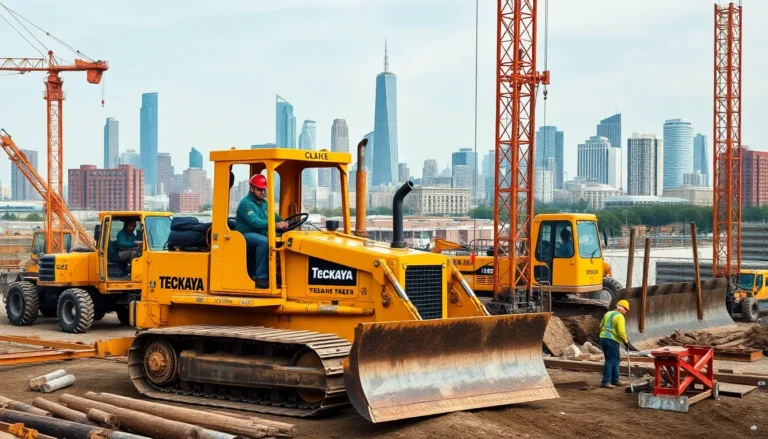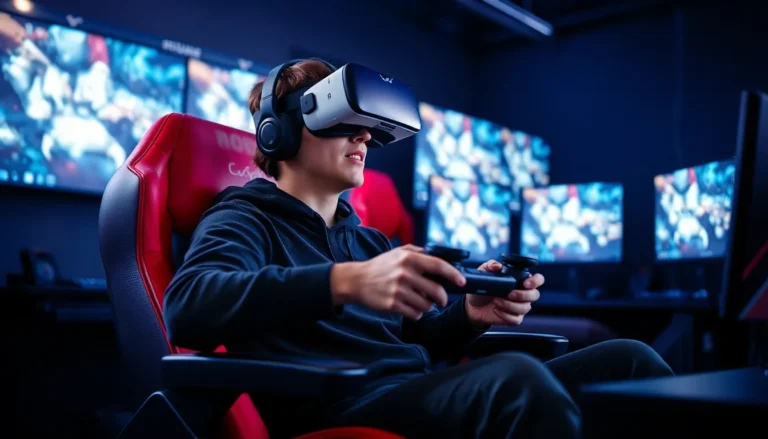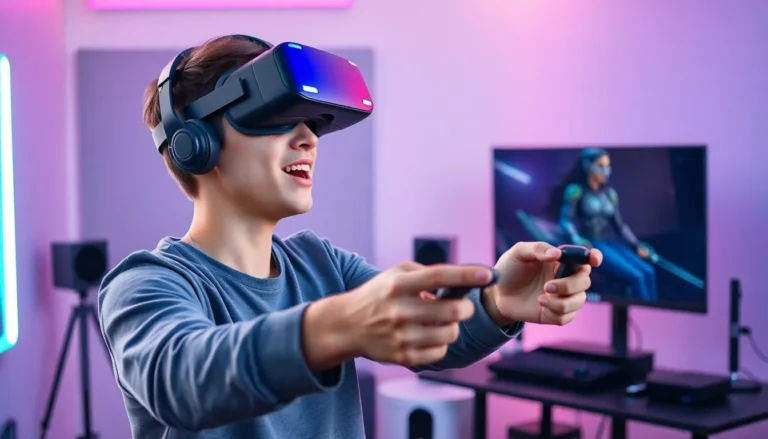In a world where virtual reality feels more like a playground than a platform, VR modding communities are the unsung heroes crafting wild experiences that defy imagination. These digital wizards take existing games and sprinkle their unique magic, transforming them into epic adventures or downright hilarious escapades. Want to fight dragons in a tuxedo or dance with dinosaurs? There’s probably a mod for that.
Table of Contents
ToggleOverview of VR Modding Communities
VR modding communities thrive on creativity and innovation, allowing users to expand their gaming experiences. These communities encompass diverse groups of individuals, each passionate about altering and enhancing virtual reality environments. Game enthusiasts utilize tools to create modifications that range from minor tweaks to significant overhauls.
Enthusiasts often share their creations on platforms like GitHub and Nexus Mods, fostering collaboration and inspiration. Players can find mods that introduce new gameplay mechanics, improve graphics, or create entirely new worlds. Notably, modding tools such as Unity and Unreal Engine empower users to design immersive experiences tailored to specific interests.
Key to their success is the collaboration between developers and the modding community. Developers frequently provide modding support, issuing guidelines and assets that promote innovation. This synergy encourages users to explore uncharted territories, pushing the boundaries of creativity.
VR modding communities provide a platform for learning and skill development. Users exchange knowledge about scripting, modeling, and design, resulting in a supportive environment. As newcomers engage with experienced modders, they quickly acclimate to the intricate world of VR modification.
Ultimately, these communities play a vital role in the evolution of virtual reality gaming. They enhance player engagement and offer opportunities for individual expression. In essence, VR modding communities drive the industry forward, inspiring players to immerse themselves in captivating and inventive experiences.
Popular Platforms for VR Modding

Various platforms serve as essential hubs for VR modding, supporting vibrant communities and innovative projects.
SteamVR
SteamVR stands out as a leading platform for virtual reality modding. It offers extensive support for a wide range of VR headsets. This platform promotes an engaged community of developers and modders who share their creations. Users often explore numerous mods that enhance gameplay, graphics, or user experience. Frequent updates from Valve encourage ongoing development and innovation. Many popular VR games on Steam, such as Beat Saber and Half-Life: Alyx, benefit significantly from SteamVR modding. Creators find tools readily available and community resources invaluable for learning and troubleshooting.
Oculus Modding Community
The Oculus modding community thrives with creativity and collaboration. Members actively work on a variety of mods that improve Oculus Rift and Quest experiences. Users frequently share content on forums such as the Oculus Developer forum and Reddit. Popular modifications include game enhancements, new user interfaces, and custom environments. Developers often release official tools, making it easier for modders to create and share their work. Game titles like Asgard’s Wrath and The Walking Dead: Saints & Sinners see vibrant modding activity. Community collaboration ensures that modders continuously push the boundaries of VR capabilities.
Key Features of VR Modding
VR modding communities thrive on unique features that enhance user experiences and foster creativity. Engaging content creation and innovative gameplay mechanics define these vibrant spaces.
Custom Content Creation
Modders create personalized experiences, giving players the chance to interact with content tailored to their preferences. Users can design custom avatars, unique environments, and entirely new storylines. Tools like Unity and Unreal Engine equip creators with the resources for detailed design. Community-driven platforms encourage sharing, allowing modders to showcase their creations. Popular modifications often include enhanced graphics and customized features that reflect personal artistic flair. These contributions not only enrich gameplay but also encourage collaboration among creators, resulting in a diverse array of options for players.
Enhanced Gameplay Mechanics
Improving gameplay mechanics ranks as a primary function of VR modding. Modders often introduce new abilities, game modes, and interactive elements that refresh existing titles. Innovations can range from altering physics to implementing complex AI behaviors. The VR landscape benefits from enhanced immersion and interactivity as a result of these modifications. Players gain exciting new challenges and experiences through modded features that developers may not have envisioned. Communities actively collaborate to refine and iterate on mechanics, ensuring that the gameplay stays fresh and engaging. Popular titles often see a resurgence in interest thanks to these inventive enhancements.
Challenges Faced by VR Modding Communities
VR modding communities encounter several challenges that impact their ability to thrive and innovate.
Compatibility Issues
Complicated compatibility issues arise frequently due to the diverse range of VR hardware and software. VR mods often face limitations, as different headsets like Oculus Rift, HTC Vive, and Valve Index may have varying requirements. Players experience difficulties when mods designed for one platform do not function on another. Developers constantly issue updates, yet this creates a moving target for modders. Users may find themselves unable to access certain features or enhancements unless they own specific equipment. These compatibility hurdles hinder seamless experiences, ultimately restricting the community’s growth.
Legal Concerns
Legal concerns pose significant challenges for VR modding communities. Rights around intellectual property often lead to disputes between modders and original game developers. Many developers encourage modding but establish strict guidelines that modders must adhere to. Without clear permissions, modders risk facing legal action, which may result in removing mods from platforms. Additionally, fears about potential copyright violations discourage some from sharing their creations. This complex landscape demands that modders navigate licensing agreements carefully while respecting the original creators’ rights as they expand the VR experience.
Future of VR Modding Communities
Growth in VR modding communities hinges on emerging technologies and user engagement. As VR hardware advances, modders gain access to improved tools and greater capabilities, allowing them to craft more immersive experiences. Players will likely see higher fidelity visuals and more complex environments, enriching the overall gameplay.
Collaboration between commercial developers and modders promises to strengthen innovation. Developers might support modding initiatives by providing APIs and official tools, making it easier for modders to integrate their work. This could lead to enhanced compatibility and streamlined creation, encouraging more enthusiasts to join the community.
Next, the rise of cloud-based platforms could change how mods are shared and implemented. With cloud technology, users may seamlessly upload and download modifications, making it simpler for gamers to enhance their experiences. Fast internet connections will enable faster access to a wide array of custom content, increasing player satisfaction.
The community focus on inclusivity will promote skill development as well. Newcomers can access a wealth of tutorials and resources, allowing them to develop skills in scripting and design. As more individuals contribute unique modifications, the diversity of content will expand, fostering a richer gaming environment.
Legal clarity around intellectual property will also shape the future of VR modding. By establishing clear guidelines, developers can create frameworks that protect original works while enabling modding expansion. This balance may encourage modder creativity, propelling the industry forward.
Overall, the future of VR modding communities looks promising, driven by innovation, collaboration, and accessibility. Enhanced player experiences and vibrant communities will continue to play integral roles in shaping the landscape of virtual reality gaming.
VR modding communities are truly revolutionizing the gaming landscape. By fostering creativity and collaboration, they create unique experiences that elevate gameplay to new heights. As technology advances, these communities will likely continue to thrive, introducing even more innovative modifications that captivate players.
The ongoing partnership between developers and modders is essential for overcoming challenges and ensuring compatibility. As users gain access to better tools and resources, the potential for immersive experiences will only grow. With a focus on inclusivity and clear legal guidelines, the future of VR modding communities promises to be bright, enriching player engagement and inspiring endless possibilities in virtual reality gaming.





